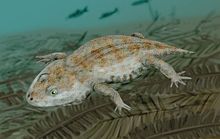Amphibamiformes
| Amphibamiformes Temporal range: Probable descendant taxon Lissamphibia survives to present | |
|---|---|

| |
| Amphibamus grandiceps | |
| Scientific classification | |
| Domain: | Eukaryota |
| Kingdom: | Animalia |
| Phylum: | Chordata |
| Order: | †Temnospondyli |
| Superfamily: | †Dissorophoidea |
| Clade: | †Amphibamiformes Schoch, 2018 |
| Subgroups | |
Amphibamiformes is an unranked clade with Dissorophoidea created by Schoch (2018).[2] It encompasses all of the taxa traditionally considered to be "amphibamids" (subsequently restricted to Doleserpeton annectens and Amphibamus grandiceps by Schoch), branchiosaurids, and hypothetically lissamphibians under the traditional temnospondyl hypothesis of lissamphibian origins. These taxa are typically small-bodied dissorophoids and form the sister group to Olsoniformes, which comprises dissorophids and trematopids.
Description
Amphibamiformes are diagnosed by a palatine and ectopterygoid reduced to narrow struts, a laterally-expanded interpterygoid vacuity, a humerus length-to-waist ratio of 6:10, and an absent basioccipital and supraoccipital.
Definition
A node-based clade; the most inclusive clade containing Amphibamus grandiceps but not Dissorophus multicinctus.
Phylogeny
Simplified phylogeny of Dissorophoidea from Schoch (2018):[2]
The phylogeny of Amphibamiformes has historically been relatively unresolved. Below are earlier analyses that recover slightly different topologies (nomenclature adjusted to reflect current status and ranks):
Fröbisch & Reisz (2008)
| Amphibamiformes | |
Anderson et al. (2008)
| Amphibamiformes | |
Gallery
- Gerobatrachus hottoni, of the early Permian of Texas; this may be a close relative of present-day amphibians
- Rubeostratilia texensis, of the early Permian of Texas, an amphibamiform of uncertain relations
References
- ^ So, C.; Pardo, J. D.; Mann, A. (2024). "A new amphibamiform from the Early Permian of Texas elucidates patterns of cranial diversity among terrestrial amphibamiforms". Zoological Journal of the Linnean Society. zlae012. doi:10.1093/zoolinnean/zlae012.
- ^ a b Schoch, Rainer R. (2018). "The putative lissamphibian stem-group: phylogeny and evolution of the dissorophoid temnospondyls". Journal of Paleontology. 93 (1): 137–156. doi:10.1017/jpa.2018.67. ISSN 0022-3360.
- ^ Fröbisch, Nadia B.; Reisz, Robert R. (2008). "A new Lower Permian amphibamid (Dissorophoidea, Temnospondyli) from the fissure fill deposits near Richards Spur, Oklahoma". Journal of Vertebrate Paleontology. 28 (4): 1015–1030. doi:10.1671/0272-4634-28.4.1015. ISSN 0272-4634. S2CID 128698929.
- ^ Anderson, Jason S.; Reisz, Robert R.; Scott, Diane; Fröbisch, Nadia B.; Sumida, Stuart S. (2008). "A stem batrachian from the Early Permian of Texas and the origin of frogs and salamanders". Nature. 453 (7194): 515–518. Bibcode:2008Natur.453..515A. doi:10.1038/nature06865. ISSN 0028-0836. PMID 18497824. S2CID 205212809.







